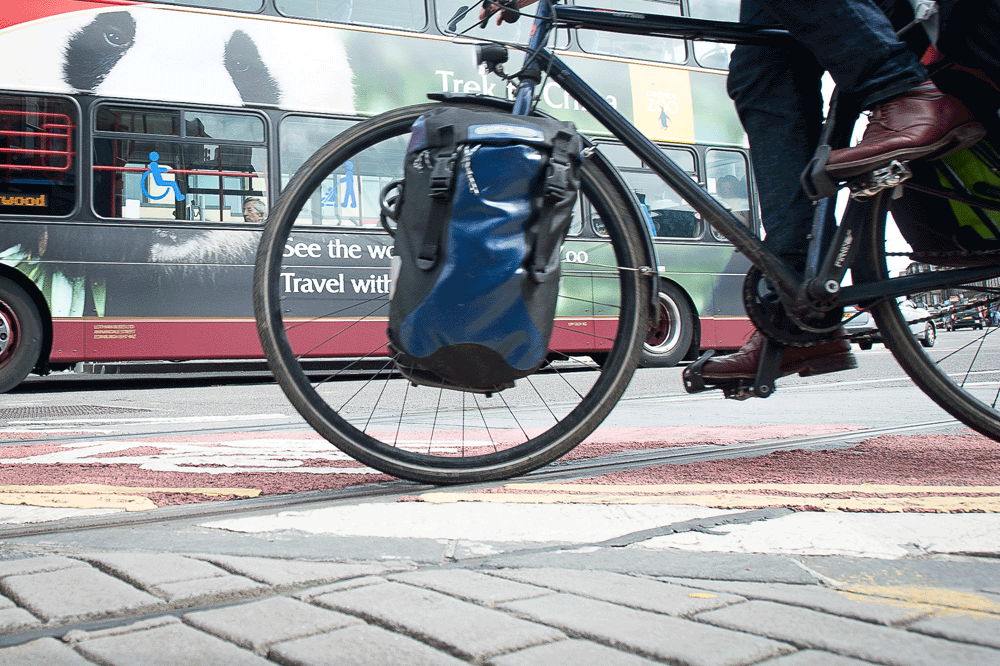EDINBURGH tram chiefs have been accused of “incompetence” after it emerged ant-skid coating may be needed on the tracks to stop cyclists crashing.
Hundreds of cyclists across the capital are now seeking compensation after sustaining injuries from the slippery tracks, part of a system that has already cost £776m.
And some have even found themselves lying on the road in heaps as oncoming trams are just metres away.
Edinburgh based lawyers, Thompsons Solicitors are currently representing 110 cyclists who have been left injured from the tracks.
And the figures are even higher than back in October last year where Thompson’s were chasing 105 cyclist claims.
Despite the trams being up and running for more than two years, it has emerged that work is underway to develop an anti-skid coating. There is currently no information about how much this will add to the bill for the trams.

Transport leader Councillor Lesley Hinds confirmed: “We understand there is work ongoing to develop skid-resistant materials specifically for tram tracks and we are interested to see how this progresses.”
But a spokesman for Taxpayers Scotland hit out, asking: “Here we go again, will this ever end?
“More incompetence and lack of expertise in a project that cost fortunes to set up and everyone said would cost further money to the taxpayer.”
Scottish Conservative transport spokesman Alex Johnstone said: “The tram fiasco cost taxpayers millions and now we hear of yet more blunders to add to the misery.
“The council should have thought of potential risks to cyclists and pedestrians long before the tram project got off the ground, safety should have been their number one priority.
“The public will no doubt be alarmed that they’re having to spend more of their hard-earned cash on a project which was already well over budget.”
Jayne Crawford, a partner at Thompsons, has urged the council to take immediate action before somebody gets seriously injured.
She said: “Other cities in the UK have managed to make their tram lines safe for cyclists so it’s about time Edinburgh City Council did the same by taking quick and decisive action. Quick fixes and half measures simply will not do.
“As each month passes, concerns grow within Edinburgh’s cycling community that accidents on tram lines still continue to happen.
“We’re about to enter the festival season when we welcome tens of thousands of visitors from all over the world.
“Many of them will choose to cycle around our beautiful city. I fear it’s inevitable that some will be injured on the tram lines in similar circumstances to permanent residents.
“The people who run our city know we all benefit greatly from these visitors and they have a duty of care to protect them as well as permanent residents.”
Mary Ranson, a Geography student from the city, is currently pursuing a compensation claim after falling off her bike on Princes Street in March this year.
The 21-year-old said: “I went to turn right and my front wheel got caught in the tram track and I fell off.
“When I looked up there was a tram there. It had stopped not far from my head. I ended up in Accident and Emergency and I have long-lasting damage to my right leg and it is never going to be as strong as it was.
“I’m pretty terrified of the trams now. I don’t enjoy cycling any more and I avoid cycling on Princes Street.”
Another cyclist added: “If you don’t hit the tracks at exactly 90 degrees, it is such a polished, smooth surface your tyres come away from you and there is a very good chance you are going to come off.”
Edinburgh’s tram system was widely criticised after it came in millions of pounds over budget and years late.
In 2003, the scheme had an initial estimated cost of £375 million but by May 2008 the cost had risen to £521 million.
The final cost after delays came to a staggering £776 million.
Dozens of local businesses and residents claimed their income was damaged due to long-term road closures.

